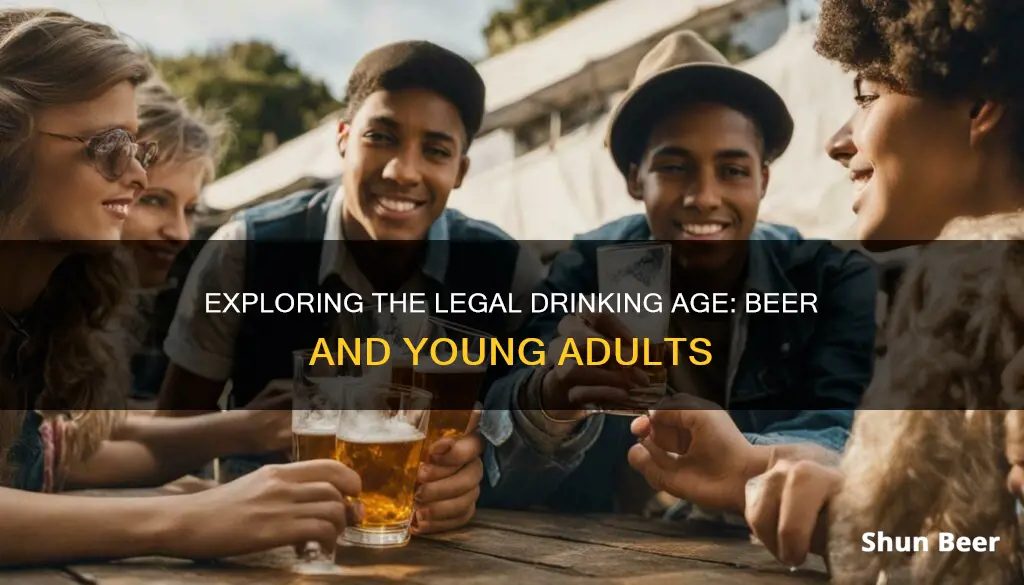
The legal drinking age in the United States is 21, and underage drinking is a serious public health concern. However, there are exceptions to the minimum legal drinking age (MLDA) in several states. These exceptions vary widely and include religious activities, educational purposes, lawful employment, parental consent, spousal consent, law enforcement purposes, and medical reasons. In 29 states, minors are allowed to possess alcohol with a family exception, and in 19 states, they are permitted to consume alcohol with the same exception. Additionally, ten states have specific social hosting laws that prohibit hosting underage drinking parties, while another 21 have general social host laws. While the laws differ across states, it is important to note that no state allows anyone other than a family member to provide alcohol to a minor on private property.
What You'll Learn

Drinking at home with family
In the United States, the legal drinking age is 21 years old. However, there are a few exceptions that vary from state to state. In 31 states, parents are allowed to serve their child a drink at home, but the child must consume the beverage under the parent's supervision and on their property. If you are 18 years old and drinking alcohol at home with your family, it is important to understand the specific laws in your state.
Some states, like North Carolina, have strict laws prohibiting any person over 21 from providing alcohol to anyone under 21. The consequences of providing alcohol to minors can include legal penalties, such as steep fines or even jail time, for the adult. It is important for parents to be aware of the risks associated with underage drinking and to make informed decisions to ensure the safety and well-being of their children.
While some parents may believe that allowing their children to drink at home will help satisfy their curiosity or teach them responsible drinking habits, studies have shown that strict rules about alcohol consumption are more effective in preventing future alcohol-related problems. Additionally, underage drinking can have negative effects on brain development and mental health, increasing the risk of depression, stress, and other issues.
If you are an 18-year-old considering drinking beer at home with your family, it is important to communicate openly with your parents and understand the laws and potential risks associated with underage drinking. It is also crucial to remember that even if a state allows parents to serve their children alcohol at home, it does not permit them to serve alcohol to their friends who are under the legal drinking age.
Grapefruit Beer and Lipitor: A Safe Mix?
You may want to see also

Drinking with parental consent
The legal drinking age varies across the world. In the United States, the legal drinking age is 21, while in other countries such as Germany and Australia, the legal drinking age is 18. In some countries, such as Japan and China, the legal drinking age is even higher at 20.
While the legal drinking age in most places is set at 18 or older, there are exceptions that allow minors to consume alcohol with parental consent. These exceptions vary by country and region, so it is important to refer to local laws and regulations. Here are some general guidelines and examples regarding drinking with parental consent:
- United States: In the US, the National Minimum Drinking Age Act establishes 21 as the national legal drinking age. However, there are exceptions in many states that allow minors to drink with parental consent. For example, in Wisconsin, underage individuals can legally drink in a bar or restaurant if they are accompanied by a parent, guardian, or spouse who is 21 or older. Similarly, California allows underage drinking in the presence of a responsible adult, and Illinois permits it when the minor is at home with a parent or legal guardian. It's important to note that these exceptions vary by state, and some states have strict laws prohibiting underage drinking.
- United Kingdom: In the UK, the legal drinking age is 18. However, there are some exceptions for 16 and 17-year-olds. With parental consent, minors in the UK are allowed to consume beer, wine, or cider with a meal in a licensed establishment, but they are not permitted to drink spirits.
- Australia: In Australia, it is not prohibited for minors to consume alcohol on private property, as long as they have parental consent or are accompanied by a parent or guardian.
- Other Countries: Other countries may have similar exceptions that allow drinking with parental consent. For example, in Abu Dhabi, the legal drinking age is 18, but hotels are only allowed to serve alcohol to individuals over 21. Each country and region has its own laws and regulations regarding alcohol consumption, so it's important to refer to local guidelines.
While there are exceptions that allow drinking with parental consent in certain situations, it is important to remember that underage drinking is generally discouraged due to potential health and social risks. The legal implications of providing alcohol to minors can also vary, and it is crucial to stay informed about the specific laws in your area.
Vaccination and Beer: What's Safe to Drink?
You may want to see also

Drinking for religious purposes
The legal drinking age in the United States is 21. However, there are exceptions to this rule in several states that permit minors to drink alcohol for religious purposes.
Religious Purposes
Twenty-six states allow minors to consume alcohol as part of a religious service or ceremony, such as drinking wine during a church service. This is permitted under the First Amendment, which protects the free exercise of religion.
Other Exceptions
In addition to religious purposes, there are several other exceptions to the minimum legal drinking age (MLDA) in the United States:
- Educational purposes: Students in culinary school may consume small quantities of alcohol as part of their education.
- Lawful employment: Minors who work in the restaurant or food and beverage industry may be able to purchase alcohol for their work but are usually not allowed to drink it themselves.
- Parental, guardian, or spousal consent: Familial consent allows minors to drink alcohol in the presence of a family member in most states.
- Law enforcement purposes: Minors may be allowed to consume alcohol for the purpose of going undercover or participating in a sting operation
- Medical reasons: Certain products and medications may contain trace amounts of alcohol.
State-Specific Laws
While the MLDA is a federal law, each state has the authority to make its own exceptions. For example, Tennessee has some of the strictest underage drinking laws in the country, only permitting those under 21 to possess or consume alcohol if they are an adult transporting or selling alcohol as part of their job, or if a religious officiant administers alcohol as part of a ceremony.
Beer and Christianity: Drinking Responsibly as a Believer
You may want to see also

Drinking for medical reasons
Drinking alcohol for medical reasons is a complex topic. While alcohol is a leading cause of morbidity and mortality, contributing to about 5 million emergency department visits and about 178,000 deaths in the U.S. each year, there are certain medical situations where alcohol can be consumed for treatment purposes.
In the U.S., the laws surrounding underage drinking are determined by each state and vary widely. In most states, it is illegal for anyone under the age of 21 to purchase or consume alcohol. However, there are exceptions in many states that allow minors to drink in certain situations, such as when they are in the presence of their parents or for religious or medical purposes. For example, in New York, it is legal for a person under the age of 21 to possess and consume alcohol if it is given to them by their parent or guardian. Additionally, 16 states allow minors to consume alcohol for "medical" purposes, although this may refer to the use of alcohol-containing medicines.
The National Institute on Alcohol Abuse and Alcoholism (NIAAA) states that there is no perfectly safe level of alcohol consumption, as current research points to health risks even at low levels of consumption. Alcohol contributes to more than 200 health conditions and is associated with an increased risk of developing liver disease, pancreatitis, gastrointestinal issues, diabetes, cardiovascular issues, and certain types of cancer.
While alcohol can have negative effects on overall health, there are some situations where it may be prescribed or recommended by a medical professional for specific conditions. For example, alcohol-containing mouthwash may be suggested by a dentist to help prevent gum disease, or a doctor may recommend a glass of red wine for heart health. It is important to note that the potential benefits of alcohol consumption for specific health conditions should always be weighed against the overall health risks associated with alcohol use.
When considering drinking alcohol for medical reasons, it is crucial to consult with a healthcare professional to ensure that it is safe and appropriate for your specific situation. Additionally, it is important to be aware of the legal implications, especially for minors, as the laws surrounding alcohol consumption vary widely by location.
Keto-Friendly Beer: What to Drink and What to Avoid
You may want to see also

Drinking laws by state
The minimum legal drinking age in the United States is 21. However, the laws regarding underage drinking vary across different states. Here is a list of drinking laws in some states:
- Alabama: There are no exceptions to the law in Alabama. The minimum drinking age is 21, and it is strictly enforced.
- Arkansas: Arkansas has a unique situation where minors are prohibited from possessing alcohol but parents are allowed to provide alcohol to their children.
- New York: In New York, underage drinking is allowed in the presence of parents. A person under 21 may possess and consume alcohol if it is given to them by their parent or guardian.
- Ohio: Ohio allows those under 21 to drink in private and public places, including bars and restaurants, as long as they are accompanied by a parent, guardian, or spouse who is 21 or older.
- Tennessee: Tennessee permits underage drinking for religious purposes.
- Washington: Similar to Tennessee, Washington allows minors to drink for religious purposes.
- Oregon: Oregon permits underage drinking on private non-alcohol-selling premises with parental consent.
- Iowa: In Iowa, minors under 18 can legally drink in a private residence under the supervision of their parents.
- Louisiana: Louisiana has some of the most permissive alcohol laws. While the minimum drinking age is 21, there are many exceptions. For example, it is legal for a parent or guardian to purchase alcoholic beverages for their underage child.
- Nevada: Nevada has very few restrictions on the sale and consumption of alcohol beyond the minimum age requirement. The maximum alcohol by volume (ABV) sold is 80%.
- Puerto Rico: The minimum drinking age in Puerto Rico is 18.
Ginger Beer and Dogs: Is It Safe to Share?
You may want to see also
Frequently asked questions
No, the legal drinking age in the US is 21. However, there are exceptions in 37 states that allow underage people to drink at home with family members.
No, the legal drinking age in the UK is 18, but it is illegal for over 18s to buy beer, wine or cider for 16 and 17-year-olds if they're having a meal together in licensed premises, like a pub.
Underage drinking increases the risk of being involved in an accident, being a victim of crime, becoming injured, and suffering from addiction later in life.







